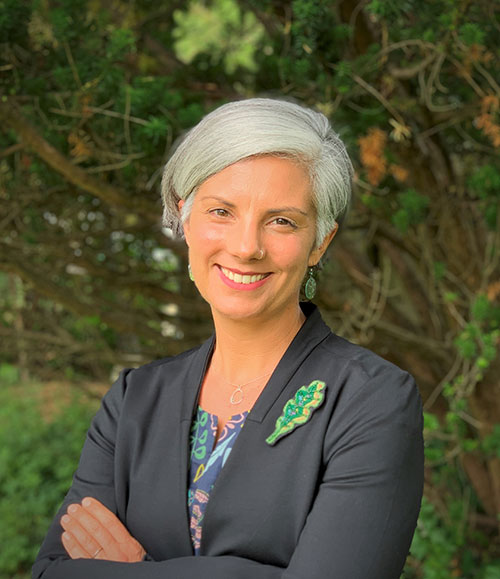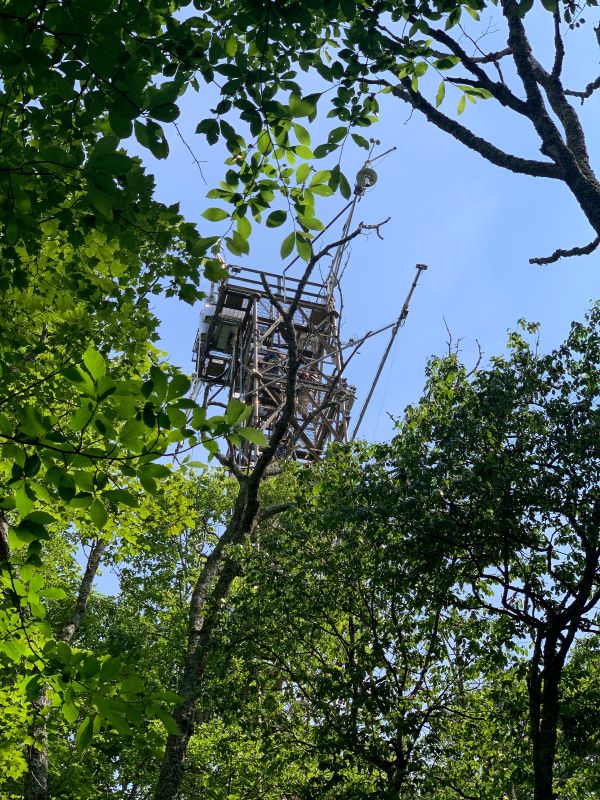Dahlin awarded NSF collaborative research grant to study climate change impacts on forest canopies
August 1, 2024 - Diane Huhn
 Kyla Dahlin, an associate professor with the Michigan State University Department of Geography, Environment, and Spatial Sciences, was recently awarded a nearly $300,000 grant from the National Science Foundation’s Division of Environmental Biology. The grant will enable Dahlin to answer key questions about how the structure of forest canopies influences ecological climate, using data from the National Ecological Observatory Network (NEON) and providing information about whether complex forest canopies can provide a buffer from climate extremes.
Kyla Dahlin, an associate professor with the Michigan State University Department of Geography, Environment, and Spatial Sciences, was recently awarded a nearly $300,000 grant from the National Science Foundation’s Division of Environmental Biology. The grant will enable Dahlin to answer key questions about how the structure of forest canopies influences ecological climate, using data from the National Ecological Observatory Network (NEON) and providing information about whether complex forest canopies can provide a buffer from climate extremes.
“Forests as natural climate solutions are currently being marketed for investment without a full understanding of climate impacts of forest management,” said Dahlin. “The products produced by this project will address this knowledge gap, provide new materials for educators, and grow a more informed ecological modeling community.”
Observations of forest canopies available from NEON provide an unprecedented opportunity to improve cutting-edge forest canopy models and can help close a gap in scientific understanding of how plants and animals in forests will fare in a changing climate and in how forest management might influence climate change. “Upon completion, this project will transform our understanding of the role that forest structure and function play in regulating ecological climate across space and time,” explained Dahlin.

Looking up at the top of the 29 m tall NEON eddy covariance flux tower at Mountain Lake Biological Station in Virginia. Sensors on the tower measure carbon dioxide exchange between the forest and the atmosphere every 30 seconds. (photo credit: Kyla Dahlin)
Dr. Dahlin’s research aims to better understand and quantify ecosystem processes and disturbance responses through the application of emerging technologies, including air- and space-borne remote sensing, spatial statistics, and process-based modeling. She is currently interested in semi-arid forest/grassland transition zones, where vegetation patterns are readily observable but poorly understood. Dahlin approaches questions by integrating observational data, modeling, and focused field experiments to both refine our understanding of ecosystem function and to improve our ability to predict how ecosystems and the climate will change in the future.
Dahlin’s grant will serve as one piece of a collaborative research grant with colleagues at Colorado State University and the National Center for Atmospheric Research, bringing the total of the award to nearly $1.8 million.
Click here to learn more about the grant entitled “MRA: Do structural and functional diversity drive ecosystem-climate coupling? Using NEON to transform ecological model paradigms across climate scales.”

